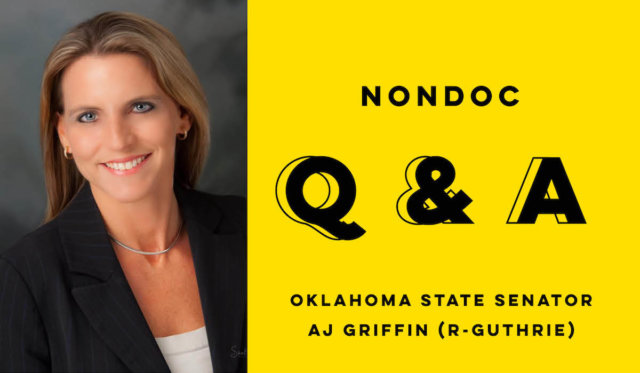Sen. AJ Griffin (R-Guthrie) was first elected in 2012 and has become the vice chairwoman of the Senate Energy Committee as well as the chairwoman of the Senate Appropriations Subcommittee on Human Services.
In the Q&A below, she discusses how she hears a different message today from voters than she did five years ago. A former educator, she also discusses education, name-calling on social media and a budgeting process that she would like to see changed. Her answers have been edited lightly for style and grammar.
What are the most rewarding and most stressful aspects of representing Senate District 20?
I find the most reward from helping constituents solve real problems. That can either be through linking them with the right service, getting an answer or by changing a statute that needs to be improved. I ran for office to solve problems and truly enjoy those opportunities. The most stressful aspect is dealing with social media and the onslaught of criticism by people who would never speak so boldly face-to-face. I’ve developed fairly thick skin, but being called names by strangers is still difficult to stomach at times.
What frustrated you the most about the 2017 legislative session? What was the session’s most positive accomplishment?
The 2017 session was by far the most frustrating since I have been elected. I’ve grown increasingly more frustrated with the approach we take toward funding government. Our budget process is broken and needs to be revamped. I believe strongly that if government is going to do something, be it build a road or teach children, that we must base the funding for those activities on the real-world needs of those doing the actual work. I am hopeful we can make changes to our budgeting system and move toward a specific, detailed budget based on what a desired activity or service costs. The 2017 session was a great session when it came to making improvements for children and families. We passed several much-needed improvements to the child welfare and juvenile justice systems and were able to make small steps forward in improving our criminal justice system.
What do you see on the horizon for the 2018 legislative session?
It looks like 2018 will bring another very challenging budget year. We haven’t addressed the structural deficit or made reforms to apportionment funding. The time for “kicking the can down road” is over. We need to step up and be willing to make hard choices to prioritize those services that Oklahomans are demanding. This may mean that some things end. We can no longer continue to take the easy way out and reduce funding across the board. It’s time to get back to the basics of governing and stick with core services.
What are voters in Logan, Kingfisher, Noble and Pawnee counties saying they want from you and your legislative colleagues? Has this changed at all since 2012 when you were first elected?
My constituents want us to fix the budget. This is dramatically different than the doorstep messages from 2012. I was first elected during the height of the tea party movement. Constituents then were concerned about gun rights and social issues. Now, I am hearing loud and clear that education funding, tax reform and budget transparency are the topics on many people’s minds.
Your parents were educators. What do you believe needs to be done to improve education in Oklahoma?
I’m a former classroom teacher myself. I taught for eight years in the Guthrie Public School District and at Meridian Technology Center in Stillwater. Improving education in Oklahoma requires us to refocus the discussion on what skills children need to be successful and then allow creative educators to tell us how to get that done. Once we have that clear vision, we need to know how much it costs to do it right and then fund it to that level. The needs of our students are changing rapidly due to technology and the massive changes in the workplace. Education can’t continue to look the same when success in the real world looks so different. I support an all-of-the-above approach so that, regardless of circumstance, every single Oklahoma child can find the setting that meets his or her needs. We also need to reward excellence in teaching with improved salaries and more support. Good students need great teachers to fully reach their potential.
The State Capital Printing Museum has posed the city of Guthrie with great opportunities but also great financial burdens over the years. While a plan has emerged to buy it back from the state, what can you say about the museum and the issues associated with it?
I’m encouraged by the latest plan to engage the community in the revitalization of the property. The chance for the state, city and a nonprofit group to partner is just the type of creativity and innovation I think we need in Oklahoma.
Imagine you are locked in the Capitol and you have to raise $300 million in new annual revenue before you can be released. What options are most appealing to you?
New revenues are best found by making better use of our current tax structure and closing loopholes. New taxes truly aren’t needed if we can bring the “off the books” economy out of the shadows and level the playing field in our tax structure. It is shocking to discover the number of businesses who are non-compliant with sales tax collections and the number of Oklahomans that fail to pay income taxes or cheat on a tax exemption. If everyone who should be collecting and/or remitting a tax was doing so, we wouldn’t have a shortfall. Furthermore, poorly performing tax incentive programs must go away. While many tax incentives are important to our economy some are just corporate welfare and should cease. I favor a tax code that is low, wide and fair.






















